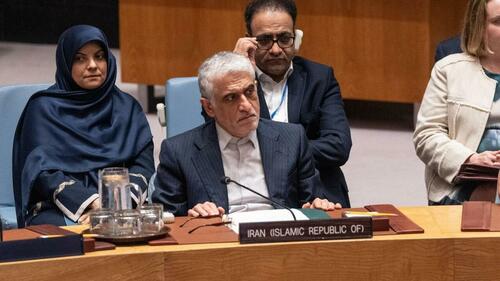In a "Face the Nation" interview on Sunday, Iran's ambassador to the United Nations, Amir Saeid Iravani, vowed that Tehran will "never stop" enriching uranium as this is an inalienable right and matter of national sovereignty under the nuclear Non-Proliferation Treaty (NPT).
Iran has constantly highlighted that its archnemesis Israel has a secret nuclear arsenal and is not a member of the NPT, while Tehran has long been a party to the treaty. "You know that we are a member, [a] responsible member of the NPT. And according to this treaty, we have the mutual rights. It means that the right of one side will be the obligation of the other sides," he said.
 Via Europa Press
Via Europa PressHe outlined rights guaranteed under the treaty as "research and development, production of uranium, and use of peaceful energy," as well as "legal protection by the IAEA for our activity and technical cooperation for our development programs."
When asked directly whether even after the 12-day war with Israel, and being on the receiving end of America's B-2 bomber campaign targeting nuclear facilities, Iravani replied, "I think that enrichment will not — never stop."
He then asserted enrichment as "our right. An inalienable right. And we want to implement this right," adding that such activity "will remain always in a peaceful manner."
Responding to allegations in Iranian media that International Atomic Energy Agency (IAEA) Director-General Rafael Grossi is "an Israeli spy" and that he should be arrested, the ambassador said, "No, there is not any threat. It is a very clear law of our parliament that they have suspended our cooperation with [the] IAEA because the agency has not implemented their rights, their responsibility … but there is not any threat against the general director of the IAEA."
As for whether the situation inside the Islamic Republic is safe enough for inspections to resume, he responded, "They are in Iran. They are in safe conditions. But activity has been suspended. They cannot have access to our site."
Meanwhile, The Washington Post has presented new evidence which strongly suggests the US strikes against Fordow, Natanz, and Esfahan were not as effective as the White House is saying:
The United States obtained intercepted communication between senior Iranian officials discussing this month’s U.S. military strikes on Iran’s nuclear program and remarking that the attack was less devastating than they had expected, said four people familiar with the classified intelligence circulating within the U.S. government.
The communication, intended to be private, included Iranian government officials speculating as to why the strikes directed by President Donald Trump were not as destructive and extensive as they had anticipated, these people said. Like some others, they spoke on the condition of anonymity to discuss sensitive intelligence.
Powerful Democratic Senator Chris Murphy will use this info and other data to support his position that "You cannot bomb knowledge out of existence — no matter how many scientists you kill."
NEW: Iran has likely begun to assess damage and conduct repair operations at the Fordow Fuel Enrichment Plant. Commercially available satellite imagery captured on June 28 and 29 shows Iranian heavy equipment near two clusters of three impact points on ventilation shafts at… pic.twitter.com/w2IyR2HpfM
— Institute for the Study of War (@TheStudyofWar) June 29, 2025
Murphy recently explained, "There are still people in Iran who know how to work centrifuges. And if they still have enriched uranium and they still have the ability to use centrifuges, then you’re not setting back the program by years. You’re setting back the program by months."
* * *
Below are more geopolitical headlines and developments via Newsquawk:
MIDDLE EAST
RUSSIA-UKRAINE
OTHER
Source link

